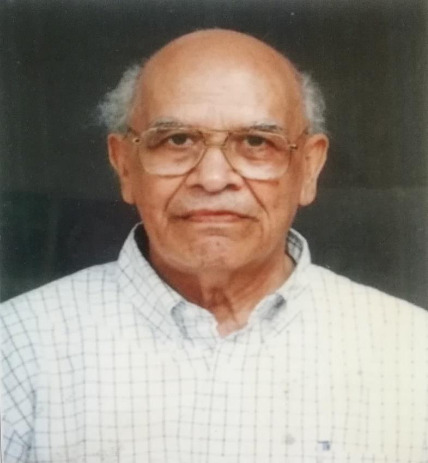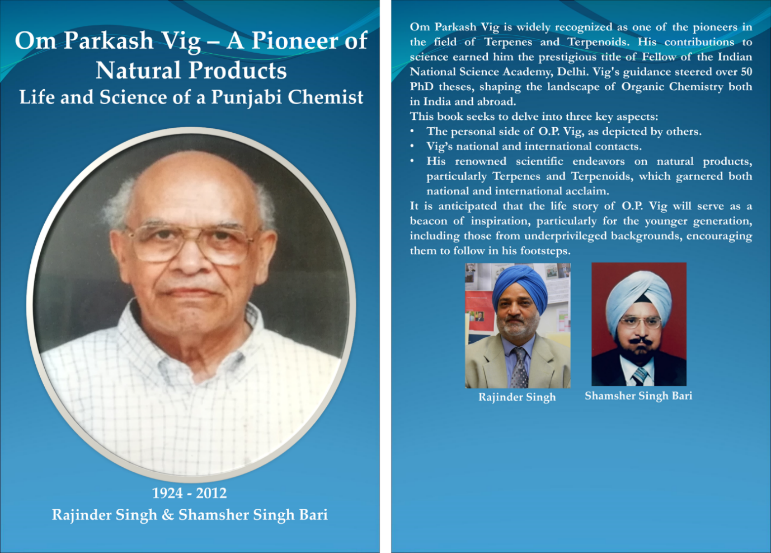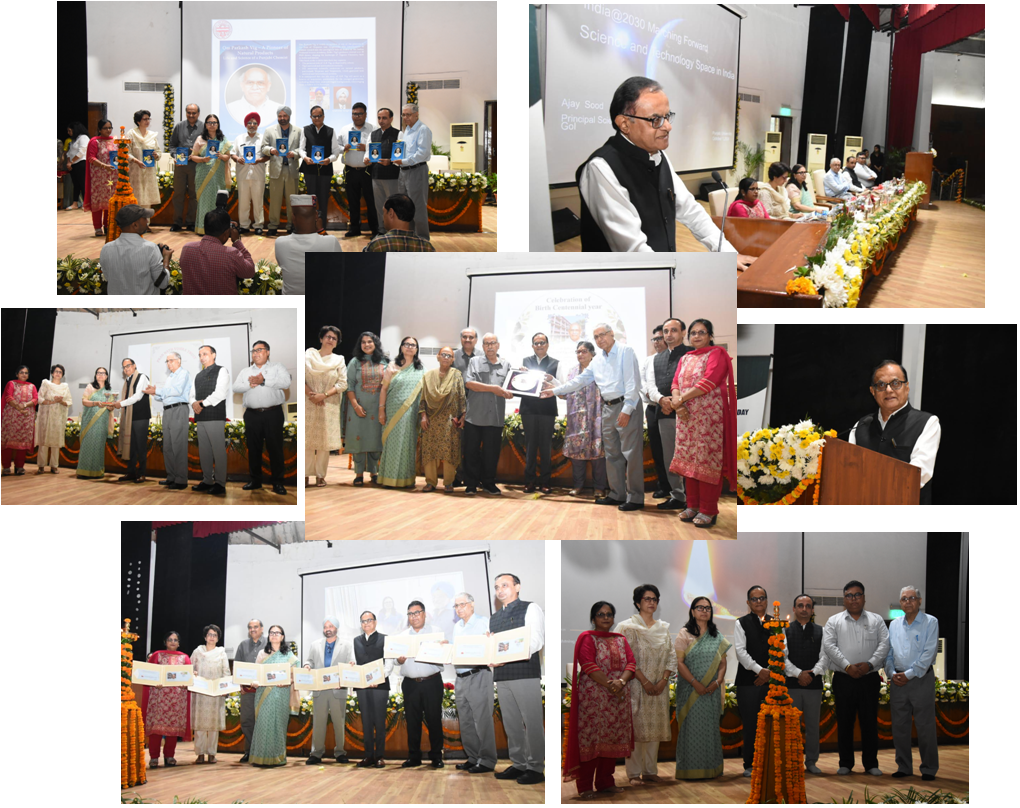Professor Om Parkash Vig

Professor Om Parkash Vig
Eminent Indian Chemist
(1924 - 2012)
About Professor Om Parkash Vig
Professor Om Parkash Vig was an eminent Indian chemist born on November 1, 1924, in Gharota, Punjab. His academic journey commenced at DAV College, Lahore, from 1942 to 1947, followed by his studies at Camp College of East Panjab University in Delhi, where he earned his BSc and MSc degrees in 1948 and 1949, respectively. Under the guidance of esteemed mentors K.S. Narang and S.M. Mukherji, Vig secured his PhD in 1956 from Government College, Hoshiarpur.
Professor Vig made groundbreaking contributions to natural products chemistry, particularly in the synthesis of: ?juvenile hormones, a large variety of terpenoids including acyclic, monocyclic, and bicyclic compounds; monoterpenes, sesquiterpenes, and diterpenoids. Along with this, he pioneered innovative methods for synthesizing organic compounds and authored over 250 research articles.
Professor Vig's illustrious career was marked by numerous prestigious awards and fellowships, including:
- 1955-1956: Junior Research Fellowship of Indian National Science Academy (INSA).
- 1957: Senior Research fellowship of INSA. He declined it and preferred to join as a Lecturer at PU w.e.f. July 1, 1957.
- 1958-1960: Post Doctoral Fellow and two years stay in Russia.
- 1962: Appointed as Reader, Department of Chemistry, PU.
- 1970: Promoted as Professor of Organic Chemistry.
- 1973: Fellowship of the INSA. Nominated as a member of delegation to attend the 3rd Indo-Russian Symposium, at Tashkent.
- 1973: Awarded J.C. Ghosh Gold Medal.
- 1974: Appointed as Head of the Chemistry Department.
- 1974: Nominated by the Vice-Chancellor to PU Senate.
- 1978: Nominated by the Vice-Chancellor to PU Senate.
- 1979: Indo-American Visitor Fellowship.
- 1978-79: U.G.C. National Lecturer.
- 1979: J.C. Ghosh Gold Medal of Indian Chemical Society.
- 1982: T.R. Govindachari 60th birthday award, University of Madras.
- 1985: Professor Emeritus, Panjab University.
- 1990-1993: INSA-Senior Scientist.
To commemorate his 100th birth anniversary, Professor Ajay Kumar Sood (Principal Scientific Advisor to the Government of India) released a biography on Professor Vig's life and a cover release to immortalize his legacy. The biographical book titled "Om Parkash Vig - A Pioneer of Natural Products" has been co-authored by Dr. Rajinder Singh, a Science Historian from the University of Oldenburg, Germany, and Professor Shamsher Singh Bari, a former Ph.D. student and colleague of Professor Vig. The book highlights the exemplary life and scientific contributions of the renowned Punjabi scientist. The 'Foreword' has been graciously provided by Professor Satinder Vir Kessar, Professor Emeritus at Panjab University, Chandigarh, a distinguished colleague of Professor Vig.
Professor Arun K. Grover, former Vice Chancellor of Panjab University, enthusiastically contributed the 'Prologue,' in which he beautifully captures the history of Chemistry education and research in Punjab, especially in the context of the partition of India in 1947. He offers insights into the development of scientific research, beginning in the Chemistry Department at Punjab University in Lahore and continuing at Panjab University in Chandigarh.
The book also includes messages from the current Vice Chancellor, Professor Renu Vig, and the Chairperson of the Chemistry Department, Professor Sonal Singhal, which shed light on various aspects of Professor O.P. Vig's life. Additionally, a brief introduction to the authors is provided.
This biography traces the life of Professor O.P. Vig, from his early childhood to his rise as Professor and Head of the Chemistry Department at Panjab University, Chandigarh. It showcases the remarkable career of this eminent organic chemist, serving as a testament to his dedication, innovative contributions, and significant impact on research in the field of Natural Products.
Chapter 1 offers an overview of the life of Professor O.P. Vig, beginning with his early years. He was born on November 1, 1924, in the small village of Gharota, District Gurdaspur, Punjab. He completed his Matriculation in 1942 with distinction, securing 83% marks from Government High School, Gurdaspur. He went on to pass his Intermediate Examination in 1944 from DAV College, Lahore, which was affiliated with Panjab University, Lahore. After the partition of India in 1947, he completed his B.Sc. (Hons) in 1948 and his M.Sc. (Hons) in 1949 from the newly formed East Panjab University. In 1956, he earned his Ph.D. under the supervision of Professor S.M. Mukherjee, Head of the Chemistry Department at Panjab University.
At the start of his academic career, Professor Vig was appointed as a Demonstrator-cum-Research Scholar in the Chemistry Department at Panjab University. In 1957, he was selected as a Lecturer in Organic Chemistry, promoted to Reader in 1962, and later appointed as Professor of Organic Chemistry in 1970. He became Head of the Chemistry Department in 1974 and held the position until 1981. He retired from University service in 1984.
In 1955, Professor Vig married Ms. Santosh Vig (née Loomba), who served as Principal of Arya School, Dina Nagar, Gurdaspur, and was honoured with both 'State' and 'National Best Teacher' awards. The couple has two children: Dr. Rashmi Nanda, who earned a Ph.D. in Organic Chemistry from Panjab University, and Mr. Sandeep Vig, who is a computer engineer.
Professor Vig is globally renowned for his groundbreaking research on Natural Products, particularly in the total synthesis of a wide range of Terpenes and Terpenoids, Juvenile Hormones, Insect Sex Pheromones, and Alkaloids. His significant contributions to the field of chemistry have earned him numerous prestigious accolades, including the INSA Fellowship. In recognition of his impact, his Ph.D. students established the Professor O.P. Vig Memorial Endowment Lectures in 1985. Additionally, Panjab University honored him with the title of Professor Emeritus.
Chapter 2 delves into the personal side of Professor O.P. Vig, exploring how his students, colleagues, and family members perceived and continue to remember him. Mrs. Santosh Vig reflects on their 57 years of marriage (1955–2012), describing him as a man of integrity, deeply committed to his work, and devoted to his principles. His daughter, Dr. Rashmi Vig, who now resides in New Jersey, USA, recalls her father as a dedicated academician and scientist with a profound love for chemistry. She emphasizes his unwavering commitment to using his research purely for academic purposes. Professor Renu Vig, currently Vice-Chancellor of Panjab University, fondly remembers her father-in-law, affectionately called 'Papa Ji,' as an exceptionally hardworking man, driven by his passion for science and learning. Even years after his retirement, he continued to visit the Chemistry Department regularly and remained engaged in his research.
His granddaughters, Ms. Ramita Vig and Saru Vig, reminisce about the lasting influence their grandparents had on their lives. They recall how Professor Vig insisted on waking them early in the morning, whether they liked it or not, and taking them on long morning walks.
Many of his Ph.D. students, such as Shiv Darshan, K.L. Matta, S.S. Rana, and others, have contributed written tributes that offer glimpses into his life and character. His colleagues, including S.D. Sharma, and Sunity Kumar Sharma, share their fond memories and admiration for him, highlighting the affection and respect he commanded.
Chapter 3 chronicles Professor Vig's scientific journey, marked by intellectual brilliance, leading to global recognition and his appointment as Professor and Head of the Chemistry Department at Panjab University, Chandigarh. This chapter also details the numerous honours and accolades he received as a distinguished scientist.
Chapter 4 highlights Professor Vig's extensive national and international network of connections with renowned organic chemists. He maintained close relationships with prominent scientists such as Dr. Ashima Chatterjee, Dr. Nitya Nand, and Dr. Sukh Dev. He was also well acquainted with Professors A.K. Bose and M.S. Manhas at Stevens Institute of Technology, Hoboken, NJ, USA, and Professor O.P. Bahl at the State University of New York, Buffalo, NY, USA. In recognition of his potential, the USSR government selected him for post-doctoral studies at Moscow State University, where he spent two years (1958–1960).
Throughout his life, Professor Vig remained closely associated with Punjab University, first in Lahore and later in Chandigarh. Chapter 5 provides a brief historical review of both institutions including their Chemistry Departments. This review offers insight into the origins of Vig's research, highlighting the working conditions and academic environments that influenced his studies and subsequent scientific achievements.
Chapters 6 and 7 delve deeper into Professor Vig's scientific journey, tracing his evolution from a Ph.D. student to a seasoned organic chemist who inspired countless young students and shaped their academic careers. His dedication to the challenging field of synthetic organic chemistry, which requires immense perseverance and motivation, led to the publication of over 250 research papers and the supervision of more than 50 Ph.D. students.
This biographical book will inspire current and future generations of scientists by showcasing the importance of persistence, creativity, and ethical research practices. It is a valuable addition to scientific literature and an excellent resource for those interested in organic chemistry and the post-partition scientific advancements made by the Chemistry Department, PU Chandigarh.
Centenary Year 2024 Celebrations at Panjab University:
The Vice Chancellor of Panjab University has declared the 100th year of his birth:
- In honor of his centenary, Professor Ajay Kumar Sood, Principal Scientific Adviser to the Government of India, released a biography chronicling Professor Vig's life, achievements, and scientific contributions.
- The Vice Chancellor of Panjab University, Professor Renu Vig has unveiled a cover release to immortalize his legacy and inspire future scientists. She further added that according to Jaswant Singh Bali's biography, he mentioned Professor Vig as a "brilliant Oma of Gharota". He also admired his brilliance by mentioning "Oma nu tan geographia balla aunda si".
- To commemorate his birth centenary, Professor S.S. Bari and Dr. Rajinder Singh wrote a book entitled: Om Parkash Vig- A Pioneer of Natural Products (Life and Science of a Punjabi Chemist).

The photographic reminisces captured during the event:
